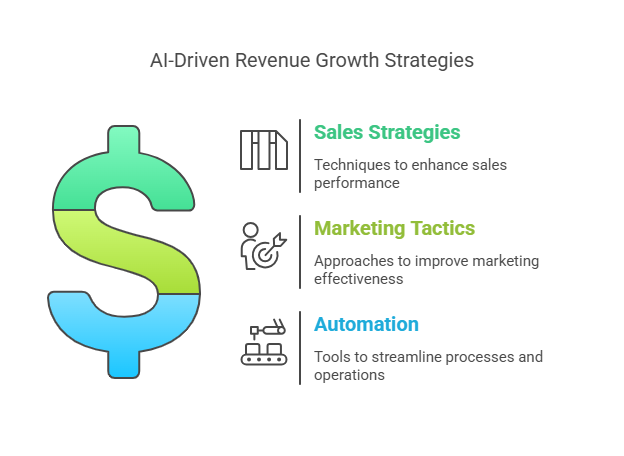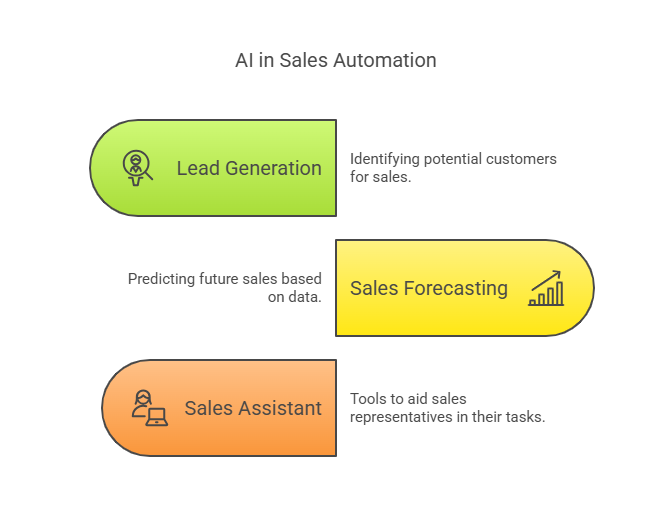Introduction: The Rise of AI in Sales and Marketing
AI in Sales and Marketing is transforming how businesses connect with customers, generate leads, and close deals faster than ever before. In a competitive and digitally driven world, traditional strategies fall short. With evolving customer behaviors and increased demand for personalization, businesses are turning to AI automation to boost revenue, optimize engagement, and streamline their workflows.
The Problem: Traditional Sales & Marketing Challenges
- Time-consuming lead generation and qualification processes.
- Lack of personalization, leading to lower engagement rates.
- Manual data analysis slows down decision-making.
- Inefficient follow-ups, causing lost sales opportunities.
Agitate: The Cost of Not Using AI
Businesses that fail to adopt AI-powered marketing automation and sales automation are losing valuable time and revenue. While competitors leverage AI-driven insights, outdated manual efforts lead to missed opportunities, low conversion rates, and poor customer experiences.
Solution: AI-Powered Automation in Sales & Marketing
By integrating AI, businesses can automate repetitive tasks, gain deeper customer insights, and personalize interactions at scale. Let’s explore how AI is driving revenue growth across sales and marketing functions.

How AI is Transforming Sales & Marketing
AI in Sales Automation:
1. AI-Powered Lead Generation & Qualification
Finding the right leads is crucial for any business. AI tools analyze customer data, website behavior, and social media activity to identify high-potential leads.
- Chatbots and virtual assistants handle initial inquiries and qualify leads.
- Predictive lead scoring prioritizes prospects most likely to convert.
- Automated CRM updates keep track of interactions and behaviors.
2. AI-Driven Sales Forecasting
AI enhances sales forecasting by analyzing past data, trends, and customer behavior to predict future revenue accurately.
- Machine learning models analyze historical data for better forecasting.
- Sentiment analysis helps sales teams understand customer emotions.
- Automated reporting provides real-time sales insights.
3. AI-Powered Sales Assistants & Automation
AI-driven sales assistants help teams by automating administrative tasks, allowing sales reps to focus on closing deals.
- AI-powered scheduling tools reduce no-shows for meetings.
- Automated email follow-ups nurture leads effectively.
Voice AI assists in call analysis and recommendations.

AI in Marketing Automation:
1. Personalized AI-Powered Content Marketing
AI analyzes user behavior and preferences to create highly personalized content, improving engagement rates.
- AI-driven content generation suggests blog topics and drafts content.
- Dynamic email personalization increases open and conversion rates.
- AI-powered social media automation schedules and optimizes posts.
2. AI-Driven Customer Insights & Sentiment Analysis
Understanding customer emotions and preferences is key to effective marketing. AI helps by analyzing vast amounts of data.
- Natural language processing (NLP) deciphers customer feedback.
- AI-based sentiment analysis tracks customer satisfaction in real time.
- Behavioral analysis predicts customer needs and intent.
3. AI-Powered Advertising & Retargeting
AI enhances digital advertising by optimizing ad placements, budgets, and audience targeting for better ROI.
- Programmatic advertising automates ad buying in real time.
- AI-powered A/B testing improves ad performance.
Predictive analytics helps refine audience segmentation.

The ROI of AI Automation in Sales & Marketing:
Businesses investing in AI-driven sales and marketing automation see significant improvements:
- 30-50% increase in lead conversion rates with AI-powered lead scoring.
- 40% reduction in marketing costs through automation and data-driven decision-making.
- Faster deal closures with AI-enhanced sales assistants and automation.
Higher engagement rates due to AI-driven personalization.
How to Implement AI Automation in Your Sales & Marketing Strategy
1️. Assess Your Business Needs – Identify areas where AI can optimize efficiency.
2. Choose the Right AI Tools – Select AI-powered CRMs, chatbots, and analytics platforms.
3. Integrate AI with Existing Systems – Ensure seamless automation without disrupting workflows.
4. Train Your Team – Provide necessary training to maximize AI adoption.
5. Monitor & Optimize – Continuously refine AI strategies for better results.
Conclusion:
AI-driven sales and marketing automation is no longer a luxury—it’s a necessity for businesses aiming for sustainable revenue growth. By leveraging AI-powered lead generation, personalized marketing, and data-driven decision-making, businesses can enhance efficiency, improve customer engagement, and drive higher profits.
Ready to transform your business with AI automation? Start integrating AI-powered tools today and stay ahead of the competition!
🎯 Target Smarter. Sell Faster. Convert More.
Unlock AI-powered sales & marketing that actually works.
🚀 Get Your Free AI Game Plan Now
FAQs
Q: How does AI improve sales and marketing automation?
AI enhances sales and marketing by automating lead generation, customer engagement, content personalization, and data-driven decision-making, ultimately driving revenue growth.
Q: What are the best AI tools for sales and marketing?
Some top AI tools include HubSpot, Salesforce Einstein, Drift, ChatGPT and Marketo for sales and marketing automation.
Q: Can AI replace human sales and marketing teams?
No, AI complements human efforts by automating repetitive tasks, allowing sales and marketing teams to focus on strategic decision-making and relationship building.
Q: Is AI marketing automation cost-effective for small businesses?
Yes, AI-powered tools can help small businesses optimize marketing efforts, reduce costs, and increase efficiency by automating tasks like email campaigns and customer insights.
Q: How can businesses get started with AI automation?
Start by identifying areas that need automation, choosing AI tools, integrating them with existing systems, training your team, and continuously optimizing AI strategies.

